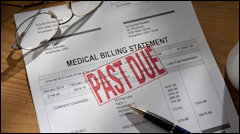 Surprise bills for medical care that Virginians expected insurance to cover are on the rise, a General Assembly healthcare panel was told yesterday. (The Daily News has the story here.)
Surprise bills for medical care that Virginians expected insurance to cover are on the rise, a General Assembly healthcare panel was told yesterday. (The Daily News has the story here.)
Typically, the unexpected charges occur when patients are billed from outside their insurance company’s network. A person might go to a doctor who orders a test from a lab that has no agreement with the insurance company. Or a someone might go to an emergency room and get a bill from an anesthesiologist or pathologist outside the network. Or an emergency-room patient might wind up spending the night at an out-of-network hospital.
Another problem is the absurdly inflated prices attached to services for which insurance companies negotiate steep discounts. If a patient goes out-of-network, they get stuck with the inflated price. In one example cited in the hearing a Blue Cross Blue Shield member on the Virginia Peninsula was charged $3,687 for urinalysis tests over three months that allegedly could have done at Rite Aid for $50.
“There’s no excuse for these kinds of charges for something somebody else is making money with at $50. Basically, it’s fraud,” snapped state Sen. Frank Wagner, R-Virginia Beach.
Bacon’s bottom line: Well, labeling the charges “fraud” is unhelpful hyperbole — although I can understand the sentiment. Providers aren’t acting out of some nefarious desire to stick it to their patients. They are trapped in a fundamentally flawed system with two core components.
First, providers charge prices for services that bear no relationship to the cost of providing the services; they do so as part of their annual dance with insurers, which negotiate discounts as part of their value proposition to members. Over the years, the prices have become untethered from reality. Anyone stuck paying the list prices is totally and utterly hosed.
Second, insurers have found that they can negotiate steeper discounts by creating exclusive provider networks. Hospitals, doctors and others are willing to offer steeper discounts for policies that steer patients to them. In a marketplace with multiple insurers and multiple providers, the relationships can get very complex and confusing. Checking to see who is in-network and out-of-network can be problematic if the need for treatment is urgent, as it typically is in an emergency room.
The danger I see is that the General Assembly might create some arbitrary consumer protection that generates unintended consequences in which the new set of problems is even worse than the original set. Before taking hasty, ill-considered action, legislators need to attack the root of the problem — the insane disparity between list prices and negotiated prices. That’s where the system has broken down, and that’s what needs to be fixed.


